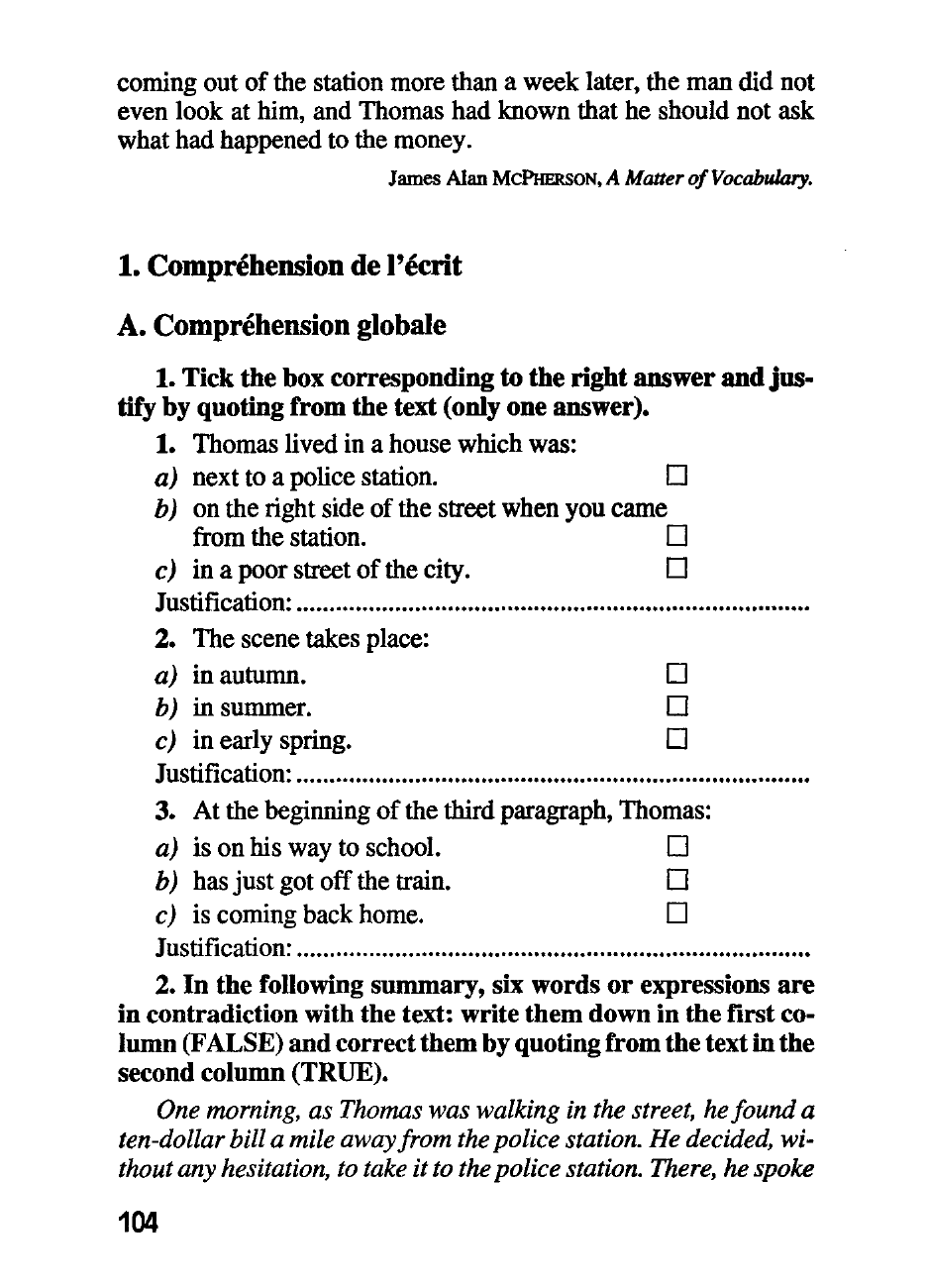ÉTRANGER-GROUPE 1, SESSION DE JUIN 1995 LANGUE VIVANTE I
Publié le 08/08/2014
Extrait du document

They lived on the top floor of a gray wooden house next to a fu-neral parlor. Thomas and his brother could look out the kitchen win-dow and down into the rear door of the funeral parlor, which was always open, and watch George Herbs, the mortician, working on the bodies. [...]
Down the street, almost at the corner, was a police station. There were always fat, white-faced, red-nosed, blue-suited policemen who never seemed to go anywhere sitting in the small room. Also, these two men and had never spoken to Thomas except on one occasion when he had been doing some hard thinking about getting on the Right Side on Judgment Day.
He had been on his way home from school in the afternoon. It was fall, and he was kicking leaves. His eyes fell upon a green five-dollar bill on the black-sand sidewalk, just a few steps away from the station. At first he did not know what to do; he had never found money before. But finding money ont the ground was a good fee¬ling. He had picked up the bill and carried it home, to a house that needed it, to his mother. It was not a great amount of money to lose, but theirs was a very poor street; and his mother had directed him, without any hesitation, to turn in the lost five dollars at the police station. And he had done this, going to the station himself and tel-ling the men, in a scared voice, how he had found the money, where he had found it, and how his mother had directed him to bring it to the station in case the loser should corne in looking for it. The men had listened and then had spoken to him for the first time. They even eventually smiled at him and then at each other, and a man with a long red nose with gray spots on it had assured him, still smiling, that if the owner did not call for the five dollars in a week, they would bring the money to his house and it would be his. But the money never carne to bis house, and when he saw the red-nosed policeman
* Sénégal, Maroc, Gabon, Tchad, Mali, Djibouti, Italie, Turquie, Abu-Dabi, Israël, Éthiopie, Égypte, Mauritanie, Cameroun, Burundi, République centrafricaine, Bénin, Burkina-Faso, Congo, Niger, Côte-d'Ivoire, Tunisie, Grèce, Portugal, Espagne, île Maurice, Madagascar.
103
coming out of the station more than a week later, the man did not even look at him, and Thomas had known that he should not ask what had happened to the money.
James Alan MCPHERSON, A Motter of Vocabulary.

«
coming out of the station more than a week later, the man did not
even look at him, and Thomas had known that be should not ask
what had happened to the money.
James Alan McP!IERsoN, A Matter ofVocabulary.
1.
Compréhension de l'écrit
A.
Compréhension globale
1.
Tick the box corresponding to the right answer and jus-
tify by quoting from the text (only one answer).
1.
Thomas Iived in a bouse which was:
a) next to a police station.
D
b) on the right side of the street when you came
from the station.
D
c) in a poor street of the city.
D
Justification: ........................................................................\
.....
.
2.
The scene takes place:
a) in autumn.
D
b) in summer.
D
c) in early spring.
D
Justification: ........................................................................\
.....
.
3.
At the beginning of the third paragraph, Thomas:
a) is on bis way to school.
D
b) bas just got off the train.
D
c) is coming back home.
D
Justification: ........................................................................\
.....
.
2.
In the following summary, six words or expressions are
in contradiction with the text: write them down in the first co
Iumn (F ALSE) and correct them by quoting from the text in the
second column (TRUE).
One morning, as Thomas was walking in the street, he found a
ten-dollar bill a mile away from
the police station.
He decided, wi
thout any hesitation,
to take it to the police station.
There, he spoke
104.
»
↓↓↓ APERÇU DU DOCUMENT ↓↓↓
Liens utiles
- ÉTRANGER-GROUPE 2*, SESSION DE JUIN 1995 LANGUE VIVANTE I
- ÉTRANGER — GROUPE 2, SESSION DE JUIN 1995 LANGUE VIVANTE 1- SÉRIE L
- ÉTRANGER — GROUPE 1, SESSION DE JUIN 1995 LANGUE VIVANTE 2 - SÉRIE L
- ÉTRANGER — GROUPE 1, SESSION DE JUIN 1995 LANGUE VIVANTE 1- SÉRIES L ET ES/S
- SUJET NATIONAL, SESSION DE JUIN 1995 LANGUE VIVANTE I


